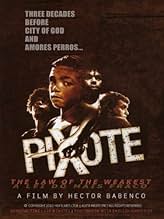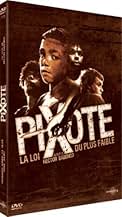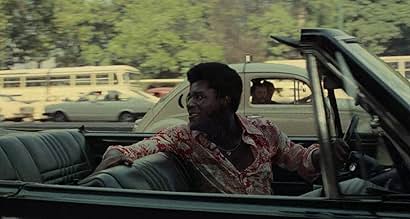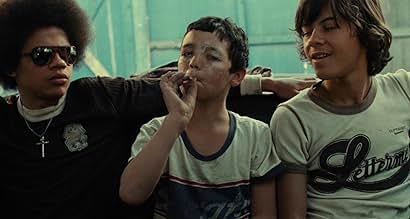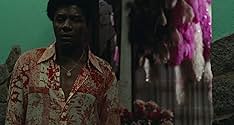NOTE IMDb
7,9/10
10 k
MA NOTE
Pris dans une rafle de police Pixote, dix ans, vit l'enfer d'une maison de redressement. Quand il retourne dans les rues de Sao Paulo, l'apprentissage de la violence a fait de lui un dangere... Tout lirePris dans une rafle de police Pixote, dix ans, vit l'enfer d'une maison de redressement. Quand il retourne dans les rues de Sao Paulo, l'apprentissage de la violence a fait de lui un dangereux délinquant.Pris dans une rafle de police Pixote, dix ans, vit l'enfer d'une maison de redressement. Quand il retourne dans les rues de Sao Paulo, l'apprentissage de la violence a fait de lui un dangereux délinquant.
- Réalisation
- Scénario
- Casting principal
- Récompenses
- 10 victoires et 4 nominations au total
João José Pompeo
- Almir
- (as Joáo José Pompeu)
Rubens Rollo
- Director
- (as Ruben Rollo)
Luis Serra
- Reporter
- (as Luiz Serra)
Avis à la une
Perhaps the most brutal filmic portrait of youth ever made; Charles Dickens meets Hieronymous Bosch in this tale of a group of boys struggling to survive in the reformatories and mean streets of Brazil as the cycle of prey transformed into predators is documented.
The saddest detail is to realize that this film, made almost twenty five years ago, documents a world that in terms of its poverty and depravity, has apparently changed very little. A brutal reality captured here but with some of the most layered acting I've ever seen in the history of film by a group of amateurs picked from the streets of Sao Paulo with no previous experience. Not one or two good performances, the entire cast is quite simply remarkable, and even sadder is the fact that most of them have probably now been swallowed by the street life they portrayed.
Not as sophisticated a vision as Bunuel's 'Los Olvidados' or as sensational as Clarke's 'Kids,' but in this genre of 'children growing up in the streets' it is easily the most emotionally powerful film of them all.
The saddest detail is to realize that this film, made almost twenty five years ago, documents a world that in terms of its poverty and depravity, has apparently changed very little. A brutal reality captured here but with some of the most layered acting I've ever seen in the history of film by a group of amateurs picked from the streets of Sao Paulo with no previous experience. Not one or two good performances, the entire cast is quite simply remarkable, and even sadder is the fact that most of them have probably now been swallowed by the street life they portrayed.
Not as sophisticated a vision as Bunuel's 'Los Olvidados' or as sensational as Clarke's 'Kids,' but in this genre of 'children growing up in the streets' it is easily the most emotionally powerful film of them all.
"Pixote: A Lei do Mais Fraco" deals with what is perhaps the greatest of all Brazilian themes: poverty. And along with poverty the other unnatural feelings and actions it brings; prostitution, violence, crime, rape and murder.
Brazil is the country of paradoxes, and its social problems are present everywhere. The difference between the rich and the poor; the beautiful and the ugly; happiness and the most profound human decay.
"Pixote" is one of the films that dare to touch and open these so painful wounds, and does it without the slightest glimmer of hope, in an honest portrayal of a country that, like Pixote himself, is already lost.
Brazil is the country of paradoxes, and its social problems are present everywhere. The difference between the rich and the poor; the beautiful and the ugly; happiness and the most profound human decay.
"Pixote" is one of the films that dare to touch and open these so painful wounds, and does it without the slightest glimmer of hope, in an honest portrayal of a country that, like Pixote himself, is already lost.
10shneur
This is a difficult movie to watch, and would have been even more difficult had I known then that the actor playing the protagonist was in fact killed in his home by police at age 19. Pixote (PeeWee) is a street kid in Sao Paulo who is caught in a roundup triggered by a murder in which he had no involvement. He is committed to a juvenile prison where he witnesses brutality and exploitation that ordinary citizens try very hard to believe doesn't exist. When finally he escapes, he and three comrades survive by the only means they know, which is crime. What makes the film so heart-rending is that both Pixote and the actor portraying him clearly do not wish to be the characters life circumstances have made them. Pixote tries to trust and to love and to bond, but there simply is no room in his world for the gentle side of human nature. One is left at the end wanting desperately to do something for the Pixotes of the world, but what? Building more children's's prisons with higher walls surely is not the answer...
The violent death of Fernando Ramos Da Silva only eight years after the completion of this film, only adds to the poignancy of dierector BAbenco's powerful message. The film is split into two halves - the first in a reformatory where a group of youngsters are abused and violated by the violent law enforcers and guardians. The second backdrop is the city where they are confined instead by their own actions and morality, which includes mugging, pimping and killing different characters who enter their lives.
The differing gender and sexual roles in the film allow for constant changes in the characters as they interact with other people. Particularly interesting is teh character of Lalica, a transvestite who is mother and lover to some of the children. Her reaction to the arrival of Sueli, a prostitute is both poignant and tragic.
There is no happy ending to this story and i reccomend to watch it with caution as there are some very uncomfortable scenes to watch especially in teh opening twenty minutes. But whilst watching it, it is important to remember that this is not just a fictional tale. The actors are not trained professionals but instead boys selected from the streetsof Sao Paulo. They actually lived this life that is portrayed so vividly on screen and in da Silva's case, died at the hands of the police who are depicted so brutally. A documentary? A piece of fiction. It borders on both but it certainly makes for heart wrenching material and is a film that actually leaves you breathless and thinking long after having watched it.
10/10
The differing gender and sexual roles in the film allow for constant changes in the characters as they interact with other people. Particularly interesting is teh character of Lalica, a transvestite who is mother and lover to some of the children. Her reaction to the arrival of Sueli, a prostitute is both poignant and tragic.
There is no happy ending to this story and i reccomend to watch it with caution as there are some very uncomfortable scenes to watch especially in teh opening twenty minutes. But whilst watching it, it is important to remember that this is not just a fictional tale. The actors are not trained professionals but instead boys selected from the streetsof Sao Paulo. They actually lived this life that is portrayed so vividly on screen and in da Silva's case, died at the hands of the police who are depicted so brutally. A documentary? A piece of fiction. It borders on both but it certainly makes for heart wrenching material and is a film that actually leaves you breathless and thinking long after having watched it.
10/10
Pixote is probably the most powerful film I have ever seen. An aspect so rarely attained in most films is the gritty reality that Babenco exposes with paramount ability and care. It truly will stay with you forever--you will be touched in such a deep way no matter who you are, no matter where you're from, no matter what movie genre you favor.
Considering that Da Silva's own life was one of the streets, leading to an early death at nineteen, when he was killed by corrupt cops in a drug raid, the film becomes all the more disturbing when we realize that Da Silva truly is Pixote in a circle of life imitating art imitating life.
With no reliable source of aide, these street kids are forced to exist at a most extreme disadvantage. The brutal truth in this film may be difficult to digest, but we can't turn a blind eye. Ultimately, words aren't strong enough to do this film justice, you'll have to experience it yourself.
Considering that Da Silva's own life was one of the streets, leading to an early death at nineteen, when he was killed by corrupt cops in a drug raid, the film becomes all the more disturbing when we realize that Da Silva truly is Pixote in a circle of life imitating art imitating life.
With no reliable source of aide, these street kids are forced to exist at a most extreme disadvantage. The brutal truth in this film may be difficult to digest, but we can't turn a blind eye. Ultimately, words aren't strong enough to do this film justice, you'll have to experience it yourself.
Le saviez-vous
- AnecdotesThe film's star, Fernando Ramos da Silva, who plays a young street criminal, actually was a street criminal before he made this film. After completing it, he took up the criminal life again, and was killed in Brazil in 1987 in an alleged shootout with police. While police reports claim that da Silva was resisting arrest, there are conflicting reports from eyewitnesses, who claim da Silva was unarmed. Furthermore, a forensic examination showed that he had been shot while lying on the ground. Both his wife and mother called the shooting "a police execution." The story of Fernando Ramos da Silva is depicted in the biographical film Quem Matou Pixote? (1996).
- Versions alternativesAll UK versions were cut by 27 secs under the 1978 Protection of Children Act. The scene removed was a panning shot showing Pixote on a bed alongside a couple having sex.
- ConnexionsFeatured in Sneak Previews: Pixote, Ragtime, Buddy Buddy, Absence of Malice (1981)
- Bandes originalesCould It Be Magic
Meilleurs choix
Connectez-vous pour évaluer et suivre la liste de favoris afin de recevoir des recommandations personnalisées
- How long is Pixote?Alimenté par Alexa
Détails
Contribuer à cette page
Suggérer une modification ou ajouter du contenu manquant


